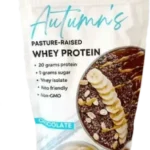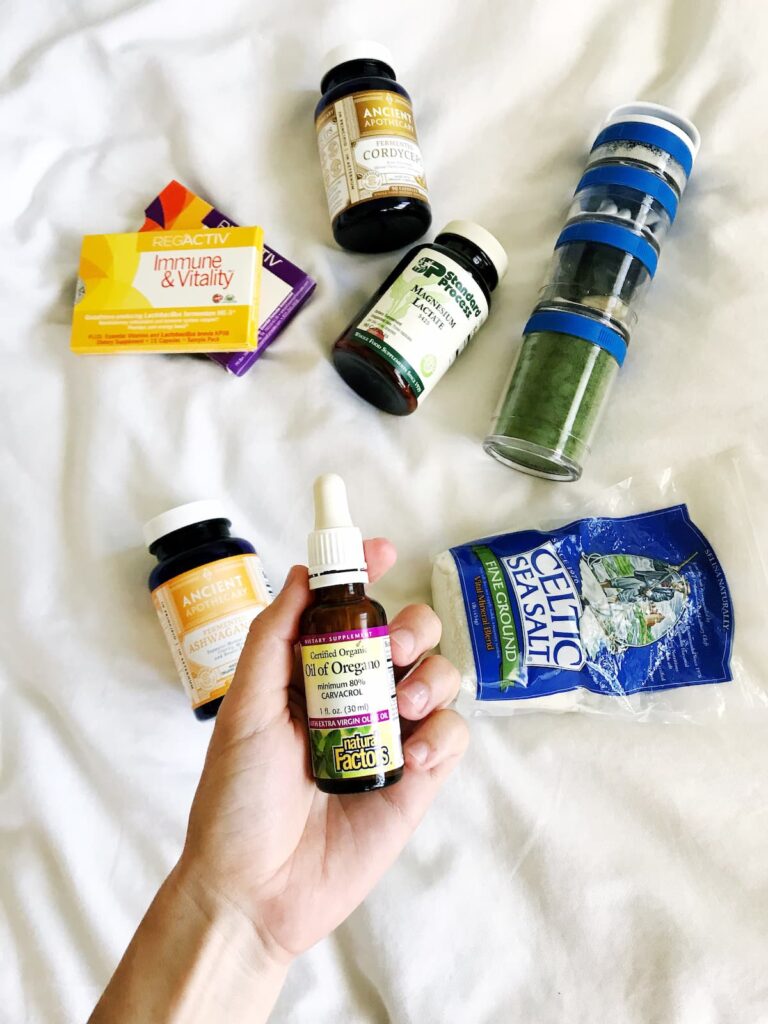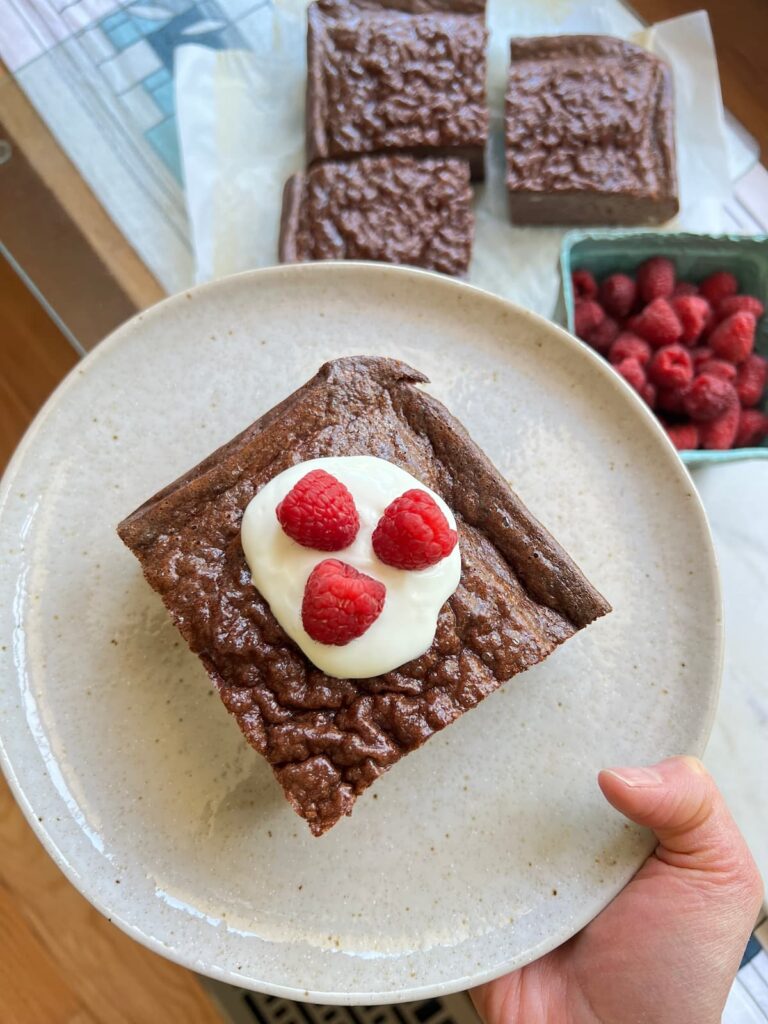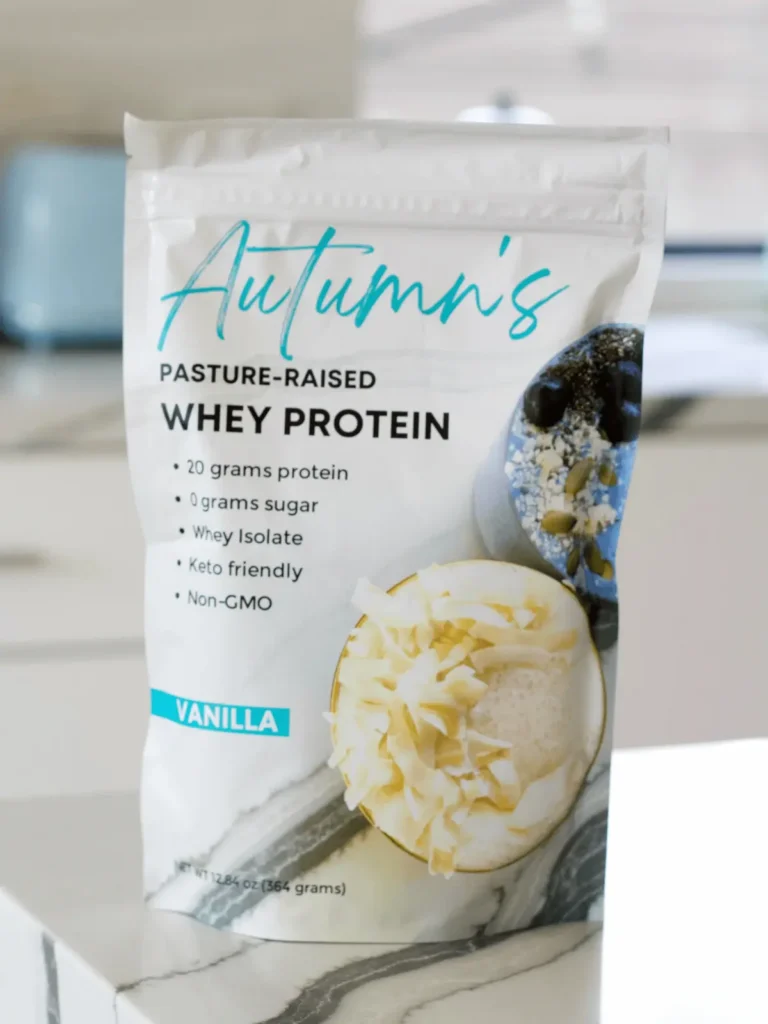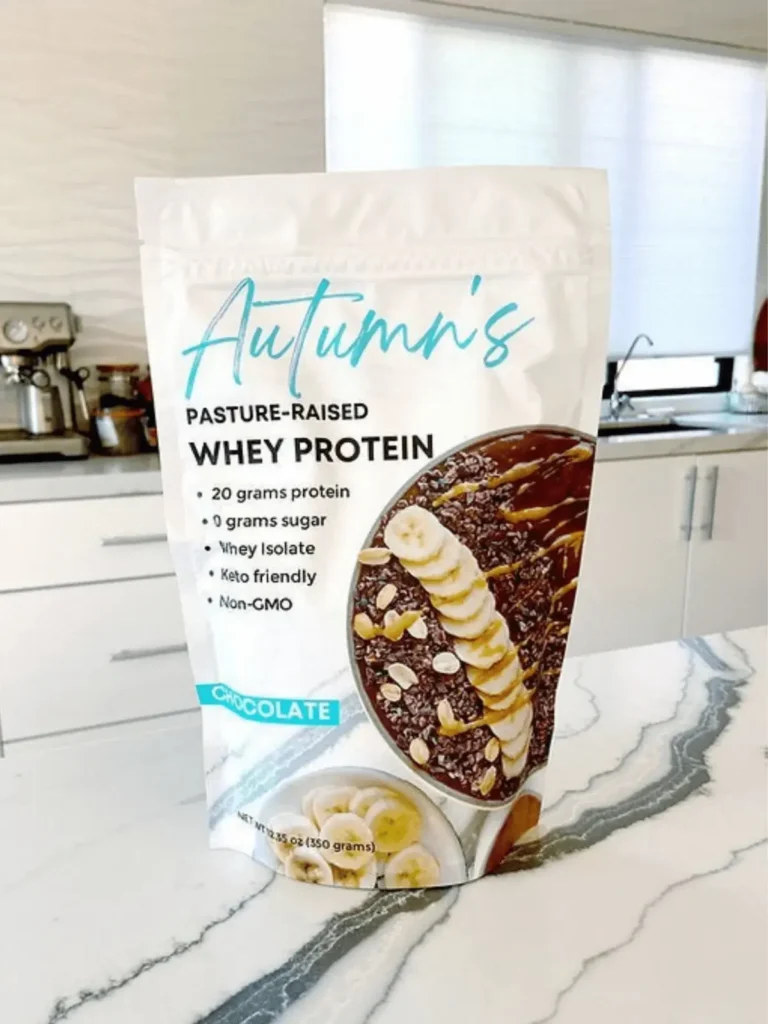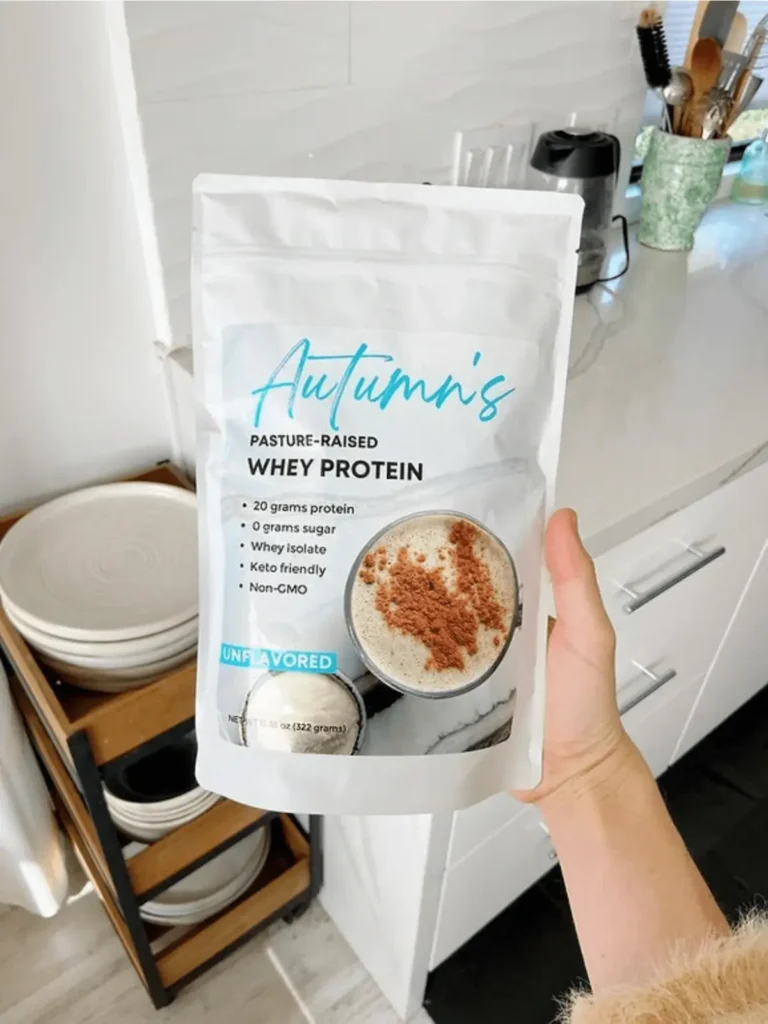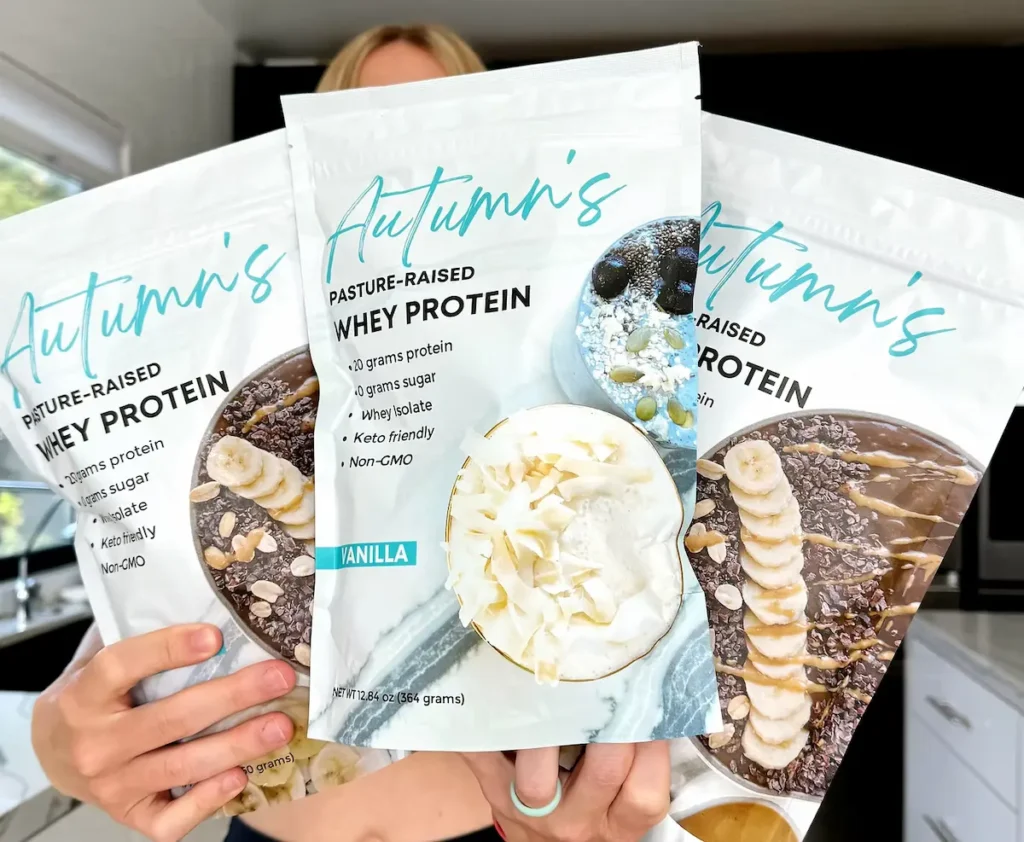Most kids can have protein powder. But the amount and type they should have depends on a few things. Here’s what you need to know.

Protein powder can be an excellent tool to help boost your protein intake. But what if your kid wants some of your protein smoothie… is that okay?
As a Nutritionist with two littles, I personally do allow my daughter to have a bit of protein powder as long as it’s balanced with other quality sources of whole food protein. This means she gets to have some tasty protein pancakes while still hitting her micronutrient needs.
But whether or not you should give your kid protein powder isn’t a clear yes or no answer. There are a few things to consider when determining whether or not you should give your child protein powder, too.
**This post is intended to be educational and is not intended to provide specific nutrition advice for your child. Please consult your doctor or nutritionist for specific protein recommendations.

Is Protein Powder Safe For Kids?
To keep it short, generally speaking protein powder is considered safe for kids, although it’s not always necessary. Some kids can benefit from incorporating protein powder in small amounts if they are active, picky eaters or have a medical condition that requires more protein.
I have two kids and one is a toddler who loves to sip on my smoothies with some protein powder in it or nibble on my protein pancakes.
Even though it’s generally considered safe for kids, should you be giving your kid protein powder?
This answer is best determined between you and your doctor or RD. But let’s dive into some details to consider.
How Much Protein Do Kids Need?
If you were to google this question, you would come up with some shockingly low numbers.
Below are the averages, as suggested by the NIH:
- Ages 1 to 3: 13 grams
- Ages 4 to 8: 15 grams
- Ages 9 to 13: 34 grams
- Females age 14 to 18: 46 grams
- Males age 14 to 18: 52 grams
But these protein requirements have long been considered outdated because they relied on nitrogen balance studies, which very accurate.
Even more interesting, researchers have stated:
“There are currently no guidelines for an ‘optimal’ protein intake that promotes healthy growth and development in the pediatric population.”
This means that the current recommendations that you might find online are purely intended to prevent deficiency, not to promote optimal growth and health.
More recent research based on advanced techniques like indicator amino acid oxidation (IAAO) has found that the current recommended protein amounts for kids is likely much higher — about 60% higher — for optimal growth and health.
With this in mind, the numbers previously listed could potentially be adjusted to:
- Ages 1 to 3: 21 grams
- Ages 4 to 8: 24 grams
- Ages 9 to 13: 55 grams
- Females age 14 to 18: 74 grams
- Males age 14 to 18: 83 grams
When determining how much protein your child needs per day, it’s crucial to factor in the latest research on proper growth and development. You can ask your doctor or RD to assess your child’s needs based on the latest protein data.
Psssst – curious how much protein YOU need to eat? Check out my free protein calculator HERE.

Potential Benefits
When considering using a protein powder for kids, there are a few potential benefits:
Picky Eaters
Picky eating can make it quite difficult to hit protein requirements for optimal growth and development.
This is especially true because picky eaters tend to gravitate toward highly processed foods that are low in protein. Low protein intakes can be problematic for long term growth and development, so addressing this issue early on could be very important.
If this is the case, your doctor or dietitian might recommend experimenting with protein powder to help boost your child’s intake.
Active Kids
The more active we are, the more protein we generally need — and this is true for kids as well.
During exercise our muscles “breakdown”, which then signals to our body that we need to rebuild those muscle fibers. This signal increases our protein need because we use the amino acids from protein to repair muscle fibers in order to make us stronger.
Depending on how active your child is, they could possibly benefit from using protein powder to supplement their intake.
Hard Time Getting Protein
Other than picky eating and increased activity, a common barrier I’ve seen to hitting daily protein requirements are allergies or intolerances.
For example, some kids are allergic to eggs and/or dairy, which could make breakfast problematic. Supplementing with a protein powder that fits your child’s allergy needs could help with filling this gap.
Sharing a Meal
This is one of the main benefits I love about giving my daughter a bit of protein powder on the occasion – we can share a tasty and nutritious meal that we both enjoy! Sage loves sipping on my smoothies or taking a bite of my yogurt bowls with protein powder stirred in.
Sharing a meal can be a special moment while also promoting healthy eating habits with your little one.
Related: My Top 10 Best Smoothies Using Protein Powder
Medical Considerations
Some medical conditions require significantly higher protein levels. If this is the case, then your doctor might recommend a protein powder to supplement your child’s intake.

Potential Risks
As a Nutritionist, I recommend both kids and adults to focus on getting the vast majority of their protein from whole food sources.
These include (but aren’t limited to):
- beef
- chicken
- fish
- pork
- lamb
- goat
- milk
- yogurt
- eggs
- tempeh
Related: High Protein Foods Chart [Free Printable PDF]
Whole food sources of protein will provide micronutrients that protein powder does not. For example, milk and yogurt have high levels of calcium and vitamin K2 which are needed for proper growth and development of the bones.
Once whole food sources of protein and micronutrients have been addressed, then adding in a high quality protein powder can help boost overall protein intake.
If all of our protein is coming from protein powder (whether we’re talking about kids or adults), then this could result in us getting too little of important micronutrients for optimal health.
A potential risk of consuming very high levels of protein in general could include kidney stones. Although it’s important to note that studies done on this topic are observational and therefore haven’t shown cause and effect.
In fact, more recent research has shown that low fluid levels and excessive sodium levels were stronger indicators of kidney stone risk in children than high protein intake.
Regardless, as a Nutritionist my biggest concern is making sure that kids are getting adequate micronutrients in addition to the macronutrients, like protein. This means adding a protein powder into a child’s diet may or may not be necessary.

What to Consider When Choosing a Protein Powder For Kids
If you choose to use a protein powder for your child (after making sure they’re also getting the micronutrients from whole food sources of protein as well), these are a few of the questions you’ll need to answer when picking the right option for them:
- Is it free of added or artificial sugars?
- Is it a high quality protein powder? (ex: high DIAAS proteins such as whey protein isolate, egg protein powder, etc.)
- Does it fit their dietary needs? (ex: allergies, gluten-free, etc.)
- Is it free of other additives that might not be safe for kids? (such as adaptogens, mushrooms, etc.)
Each child will have different needs and therefore will have different protein powders that are best for them. Always check with your doctor or nutritionist to ensure you’re picking the best option for your family.
We personally use our zero added sugar protein powder for ourselves and occasionally for our daughter Sage.
Kickstart Your Journey
Shop Autumn’s Whey Protein Powder
Our delish bestselling zero added sugar, gluten & heavy metal tested whey protein powder!
Kid-Friendly Recipes Using Protein Powder
When making recipes using protein powder, it’s important that the recipes also use whole food sources of protein as well. This will help ensure that the meal is balanced with micronutrients in addition to protein.
For example, when making a smoothie with protein powder you could also add in greek yogurt to provide additional protein as well as calcium and vitamin K2.
I personally share many of my meals that use protein powder with my daughter Sage. Below are some of her favorite recipes that use protein powder and other whole food sources of protein:
- Chocolate Chip Protein Waffles
- Blueberry Lemon Pie Smoothie
- Chia Pudding
- Protein Hot Chocolate
- Pumpkin Spice Protein Pancakes
- Edible Cookie Dough
As you’ll notice, each of the recipes use a small amount of protein powder in addition to other high protein ingredients like greek yogurt, kefir, eggs and whole milk to help provide a balance of micronutrients and protein.
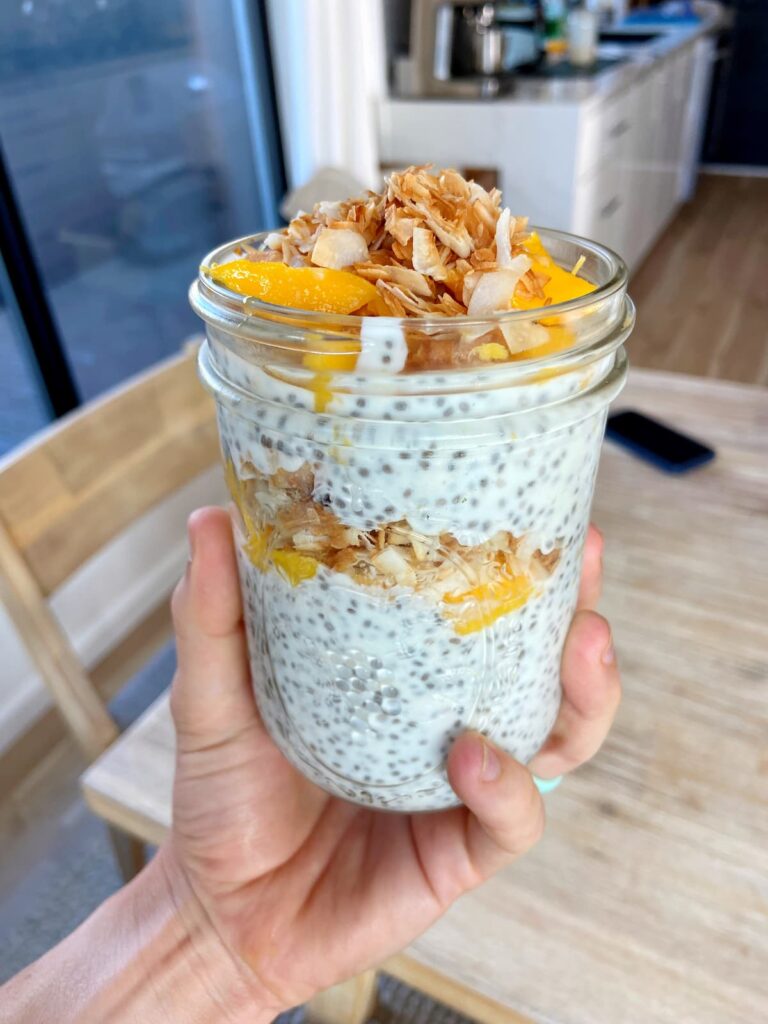
Final Thoughts
Does your kid NEED protein powder? Probably not. But can they have some of your protein smoothie or enjoy a protein waffle on the occasion? Most likely yes.
Protein is a crucial part of development and growth and protein needs for kids are likely higher than what we previously believed. But it’s always important to balance it out with micronutrients from whole food protein sources as well.
If you want more specific guidance for how much protein your child needs, make sure to check with your doctor or RD.
Other Posts You May Love
- 11 Super Tasty Low Glycemic Load Breakfasts
- Healthy Strawberry Smash Cake For Baby’s First Birthday
- 17 Delicious Healthy Smoothies For Breakfast
